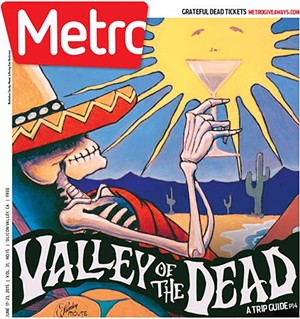Metro Silicon Valley Turns 20
march 14, 2005 03:12 pm

SAN JOSE, Calif. -- March 14, 2005 -- Silicon Valley's largest weekly, Metro, turns 20 years old this week. When it began publishing in 1985, San Jose was considered a backwater, hardly capable of sustaining a free weekly newspaper devoted to covering the valley's cultural life and presenting an alternative perspective on news and events.
In the two decades since, San Jose has eclipsed San Francisco as Northern California's largest city and Silicon Valley has been transformed by the technology boom of the 1990s. Real estate prices have soared and a wide range of cultural amenities have prospered. Today, the Silicon Valley area has professional sports teams, world-class performing arts facilities -- from Shoreline Amphitheatre to the newly restored California Theatre -- as well as nightclub districts, new museums, revitalized downtown shopping areas, free music festivals, art cinemas and destination restaurants.
The weekly Metro Silicon Valley has helped influence the changes that transformed the region. "We've turned a critical eye toward everything from development to restaurants to try and raise the bar," says Metro's co-founder and executive editor, Dan Pulcrano.
"At the same time, we have championed independent businesses and small theaters in an effort to help the valley establish its own cultural identity. We have pushed for preservation of historic buildings and agricultural lands that represent the valley's heritage and soul. And we have promoted sensible, pedestrian-oriented development that gets people out of their cars so they can get to know one another. A newspaper at its best should be a community-builder."
Metro doesn't just talk the talk -- it puts its resources behind its beliefs. The company has donated millions of dollars in cash and advertising to nonprofit groups, including arts organizations and agencies that serve the valley's disenfranchised. The San Jose Downtown Association and the San Jose Jazz Festival were literally hatched inside the company's offices, and it was a key force in the development of the SoFA district, the free Music in the Park festival and other valley institutions. In recent years, it has been a key sponsor of the globally recognized Cinequest Film Festival.
The company was founded and is still owned by a locally based group of investors. It is one of more than 100 weekly newspapers that sprang up in American cities mostly in the 1970s and 1980s and are known as "alternative weeklies" because they provide an alternative to daily newspapers. Known for lively writing, investigative reporting and a focus on trends and communities underrepresented in the mainstream media, the alternatives have continued to build readership despite efforts of dailies to emulate some stylistic attributes of the alternative press. Many of the alternatives were purchased from their founders in the 1990s during a wave of consolidation. Metro is one of the last independently owned alternative papers in the country, and still operated by its founder.
The company began acquiring community newspapers in the valley in 1990 and built a six-newspaper group known as Silicon Valley Community Newspapers (SVCN). In 1994, it began publishing Metro Santa Cruz and acquired the Sonoma County Independent, which is now known as the North Bay Bohemian and distributed in Sonoma, Napa and Marin counties. The SVCN group was sold to Metro co-founder David Cohen in 2001 as part of a company restructuring.
The group hired veteran alternative publisher Alisa Cromer in 2002 as group publisher of the three weekly newspapers, and she was named Metro's publisher in March 2005. Metro has continued to prosper under the restructured management, showing improved financial performance in spite of the much-chronicled dotcom bust that left many Silicon Valley publications reeling.
Metro has shown 16 percent growth in readership in the past year, according to the Media Audit. The weekly now reaches 731,000 readers in the South Bay -- and more readers less than 50 years of age than even the largest daily paper.
Steve Palopoli, editor of Metro Santa Cruz for the past three years, was named editor of the flagship Metro Silicon Valley on March 1. "Steve will bring a fresh, smart perspective while upholding our core mission of 'real news, real culture' -- as opposed to the faux culture of party photos, leopard-patterned iPod skin hype and teen idol interviews that the rest of the media feed to their readers, who they must contemptuously view as a bunch of dumb-asses," Pulcrano said.
Metro will commemorate its anniversary with a special issue in May and by throwing a party on May 14 that will be a fundraiser for Downtown College Prep. DCP is a downtown charter high school dedicated to preparing disadvantaged students for college. Its entire first graduating class -- all of whom were the first in their families to go to college -- are currently enrolled in four-year universities.
"We wanted to throw our 20-year celebration at this school," Cromer says, "because DCP is an institution that took on the toughest educational challenge and succeeded. It is all about what can be done in our community." Proceeds from the party will go to the Class of 2005 scholarship fund.
For more information contact Alisa Cromer at (408) 200-1303.